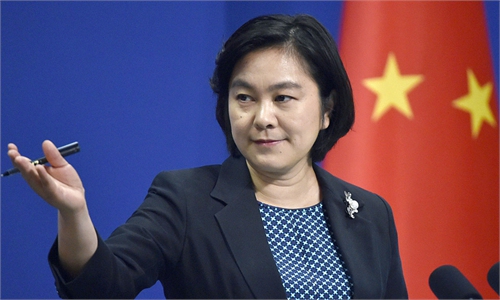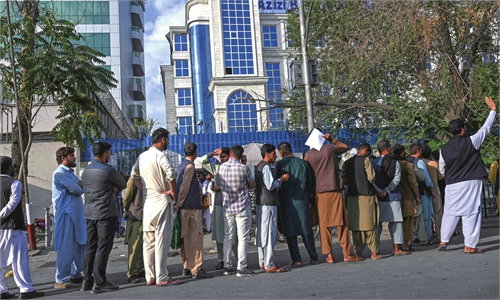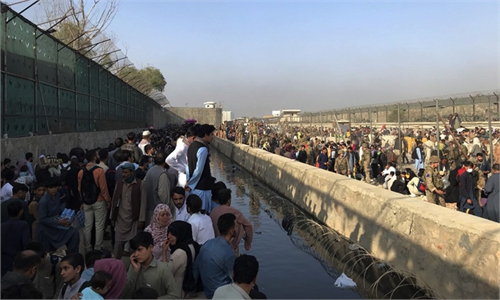Biden to meet Aug 31 Afghanistan evacuation deadline; extension risks igniting local anti-US sentiment
Hatred against US, allies long-standing issue for Taliban-West ties: expert
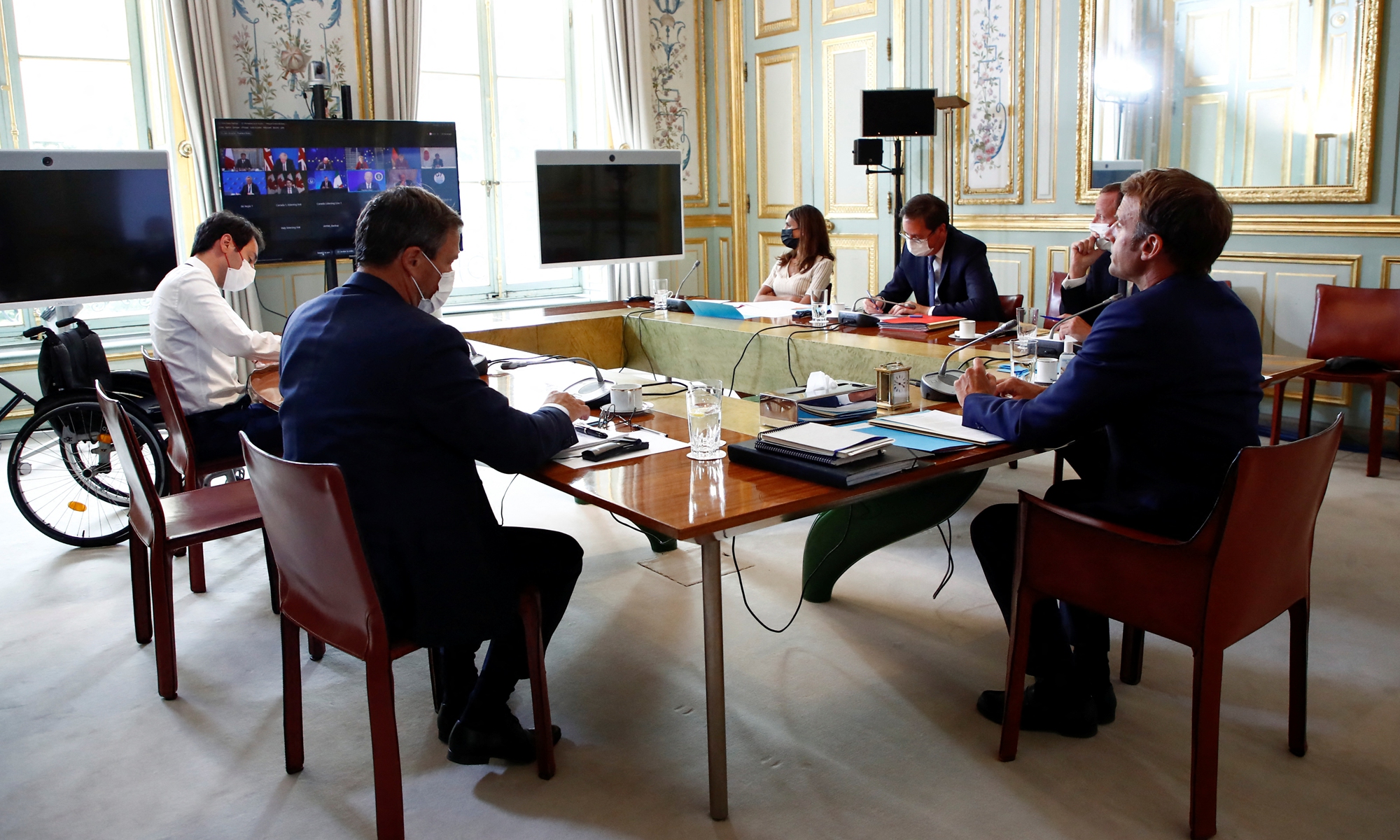
France's President Emmanuel Macron (right) takes part in a virtual G7 summit to discuss the crisis in Afghanistan at the Elysee Palace in Paris on Tuesday. Efforts to evacuate thousands of people from Afghanistan became increasingly urgent, as European nations said they would not be able to evacuate all at-risk Afghans before next week's deadline. Photo: AFP
The 20-year-long failed governance and brutal occupation by the US-led coalition in Afghanistan has created serious anti-US sentiment in the country, and the issue of extending the August 31 evacuation deadline could bring more risks as extremists and terrorists with a radical anti-US stance could use it to create new conflicts, said the experts, noting that the deep hatred against the US and its allies among Afghan society would be a long-standing problem for the Taliban to normalize its ties with the West.
Although the US and its allies, at this stage, do not want to extend military occupation in Afghanistan due to the complicated situation on the ground, they are unlikely to finish their evacuation by August 31, a deadline US President Joe Biden previously announced. The Afghan Taliban said August 31 is a "red line" and if the US and its allies seek to extend their occupation in Afghanistan, "there would be consequences."
The Taliban spokesperson Zabihullah Mujahid on Tuesday warned the US must finish evacuating people from Afghanistan by August 31 as Afghans have been told not to leave the country. Mujahid said his group will accept "no extensions" to the evacuation deadline as the Biden administration prepares for the withdrawal of all American troops.
British media reported that UK Prime Minister Boris Johnson is widely expected to ask Biden to extend the deadline at Tuesday's meeting of the Group of Seven nations. French Foreign Minister Jean-Yves Le Drian said his government was "concerned" about the deadline.
President Joe Biden has decided not to extend his August 31 deadline for completing the US-led evacuation of Americans and Afghan allies from Afghanistan, an administration official said Tuesday, AP reported.
Biden has previously said the US may push back its August 31 deadline to facilitate more evacuations, adding that "our hope is we will not have to extend." The US and its allies have evacuated about 48,000 people since the militants swept through the country this month on the heels of the US military withdrawal, the Washington Post reported.
Pan Guang, a senior expert on counter-terrorism and Afghan studies at the Shanghai Academy of Social Sciences, told the Global Times on Tuesday "it's reasonable for the US to seek an extension because the situation on the ground is truly messy, and the US also needs to evacuate the personnel of its allies. At this stage, it is all but impossible for Western countries to change their mind and restart their occupation."
But to Taliban, an extension will increase uncertainties as the US troops at the airport could be a target for many extremist anti-US forces who want to make the situation more complex, the experts said, and the Taliban's legitimacy in the country is based on fighting foreign occupation. If the Taliban allow the US to stay longer, its legitimacy will be undermined as well, and this is why the Taliban has to be tough on this issue, the experts added.
Pan said Taliban leaders need to consider the issue from a strategic perspective, because sooner or later the US will finish the evacuation, but if Taliban fighters launch an attack against US troops or aircraft after August 31, the hard-won stability in the most parts of the country would be impacted, and the majority of the people are demanding peace and stability.
"Aside from the Taliban, the two biggest anti-US forces in Afghanistan are Al Qaeda and the Islamic State(IS). They are sheltered by the Taliban in Afghanistan to some extent, and of course they are independent in taking actions," Zhu Yongbiao, director of the Center for Afghanistan Studies at Lanzhou University, told the Global Times on Tuesday.
Both the IS and Al Qaeda could play into the situation, as they are worried the Taliban may turn hostile to them as the Taliban has made commitment to the world that it will cut off ties with terrorists, so maybe terrorist groups like Al Qaeda will use the issue of the evacuation extension red line to create new conflicts, Zhu said.
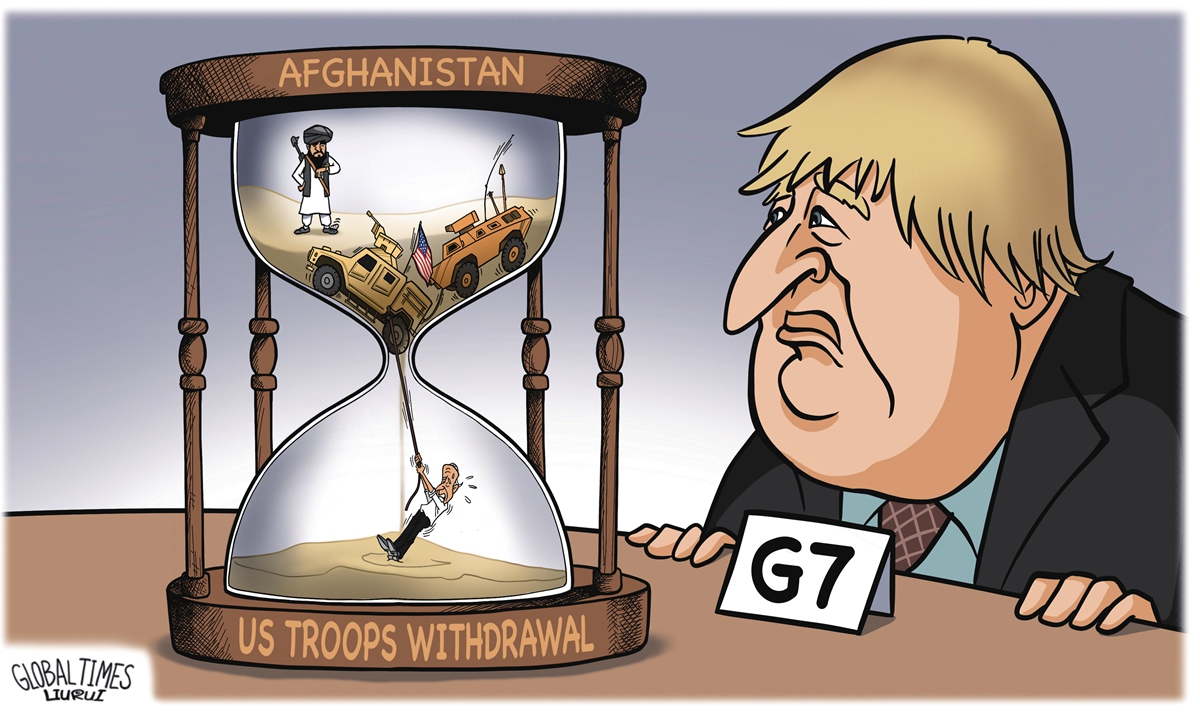
Illustration: Liu Rui/Global Times
War crimes bring hatred
The two-decade-long military occupation has created serious anti-US sentiment in Afghanistan, which could be a potential danger to the West as this would be a source for extreme anti-West or anti-US forces or terrorist groups to gain power in Afghanistan and plan another "9/11 attack," analysts warned.
A Kabul-based Chinese national who served in a local NGO and asked for anonymity told the Global Times that the majority of Afghan people have no positive memory about the US, in cities like Kabul, some people support the US occupation because they have benefited in terms of the economy, but these people are not in the majority at all.
"Those people who want to leave with the US troops at the airport are the ones who benefited from the US occupation or prefer secularization, but to be honest, they are not the majority of the country," he said.
Most of the population live in rural regions, and they are the main victims of the US occupation in past two decades, he said, adding that "Afghan people prioritize their tribes, not the country, so they are not just specifically opposing the US, they just oppose any foreign force who tries to intervene in their internal affairs and their conflicts between different tribes. They also hate the former Soviet Union and the British Empire."
The US occupation and military actions in the past two decades in the country have caused a huge amount of casualties, and US troops have allegedly tortured Afghans in prisons. There are also reports that Westerners have seriously offended local Muslims due to their blasphemous behaviors against the Koran, Qian Feng, director of the research department at the National Strategy Institute at Tsinghua University, told the Global Times on Tuesday.
The US did provide some aid to Afghanistan, but the benefits did not fall into the hands of the ordinary people, but created more and more serious corruption in the Afghan government, said Qian, noting the US should also be held accountable for connivance of the corruption.
The international community should push Afghanistan in a positive direction, uphold peaceful reconstruction, improve people's well-being and enhance Afghans' capacity for independent development. Using sanctions will not solve the problem, said Chinese Foreign Ministry spokesperson Wang Wenbin, who on Tuesday urged the US and its allies to learn from history, reflect deeply and act cautiously on potential sanctions against the Taliban.
The international community needs to think about how to prevent military intervention in another country in the name of democracy from happening again. "We should not let individual countries make mistakes, but the Afghan people and the world, especially regional countries, have to pay the bill again and again," Wang said.
The US and its allies, such as Australia, have been involved in or committed war crimes, such as being suspected of murdering civilians including children, said Qiu Wenping, an expert on Afghan studies at Fudan University.
"These war crimes should not be forgotten with the evacuation, and in the future when the peace and stability are totally restored, the international community and Afghan people should conduct thorough investigations and make the US and its allies be held accountable," he noted.
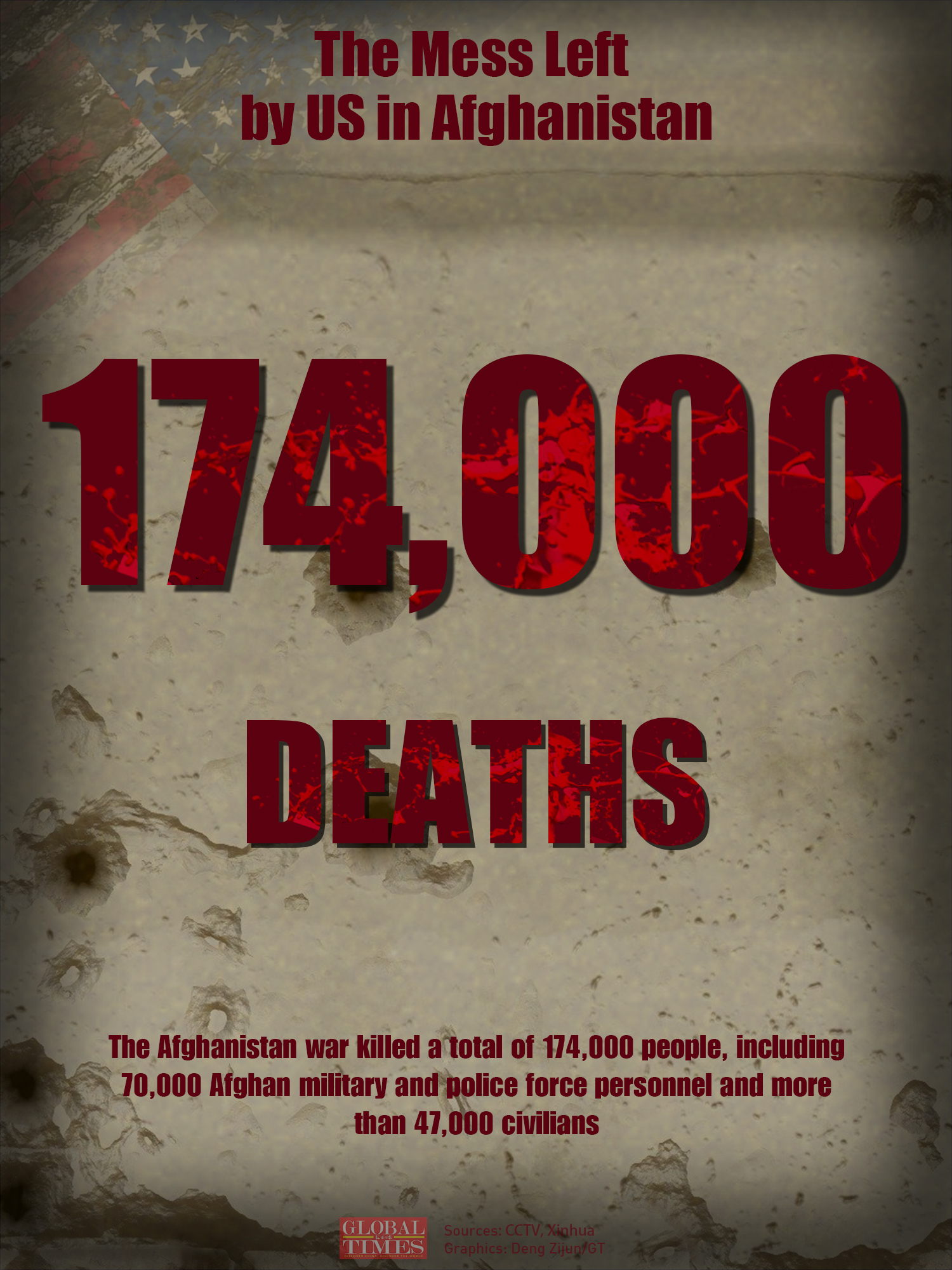
Graphic: Deng Zijun/GT

Graphic: Deng Zijun/GT
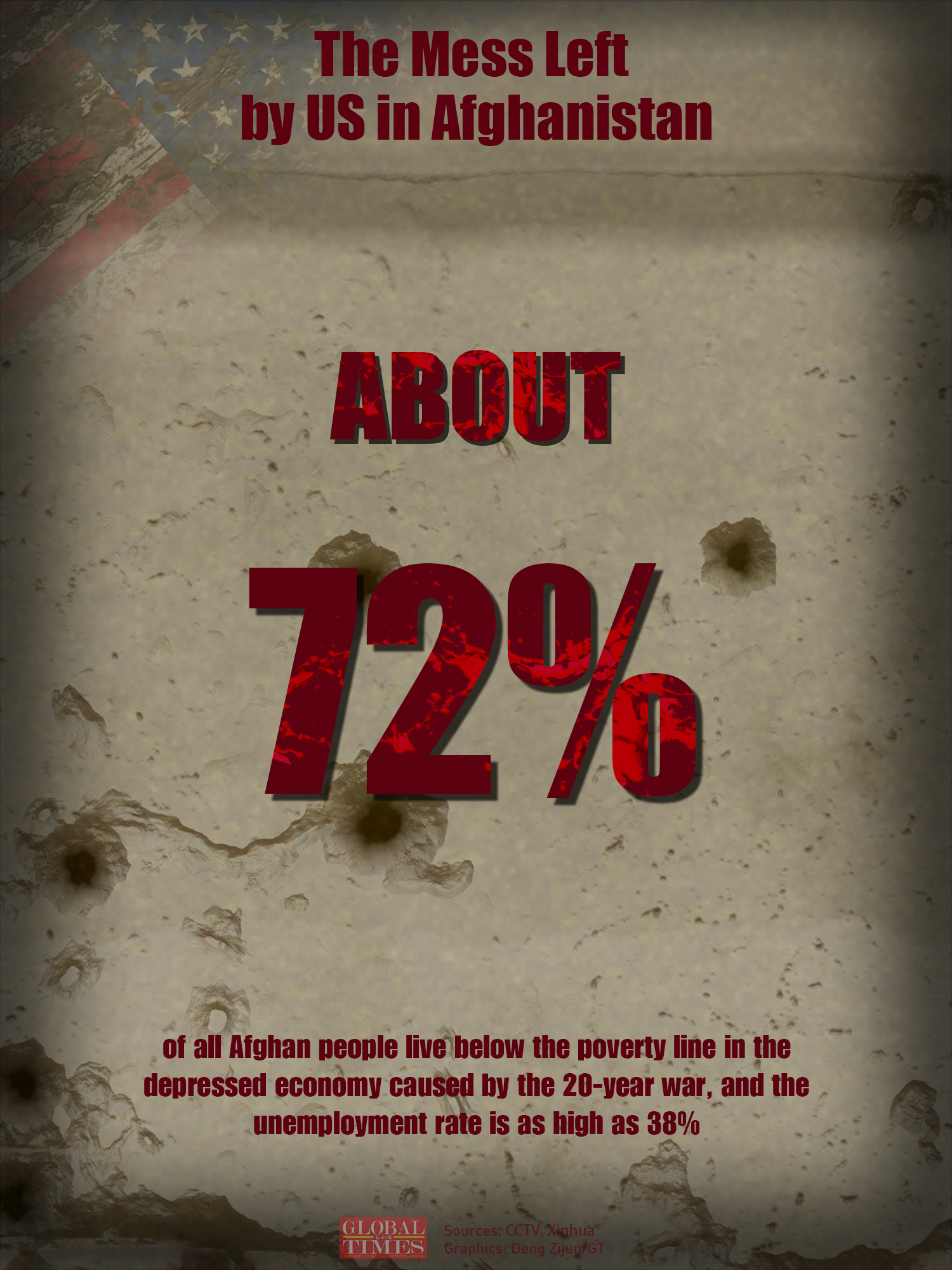
Graphic: Deng Zijun/GT
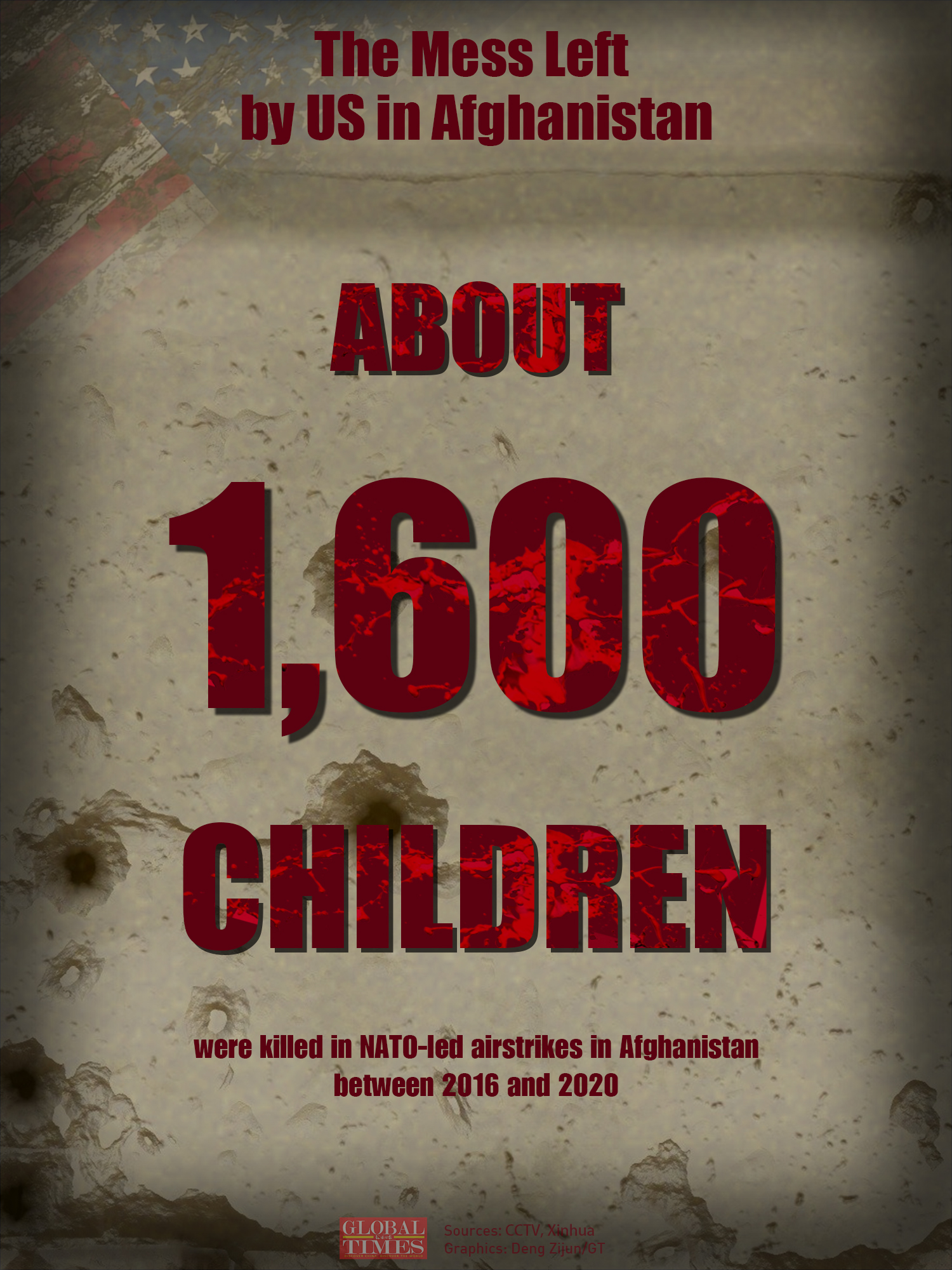
Graphic: Deng Zijun/GT
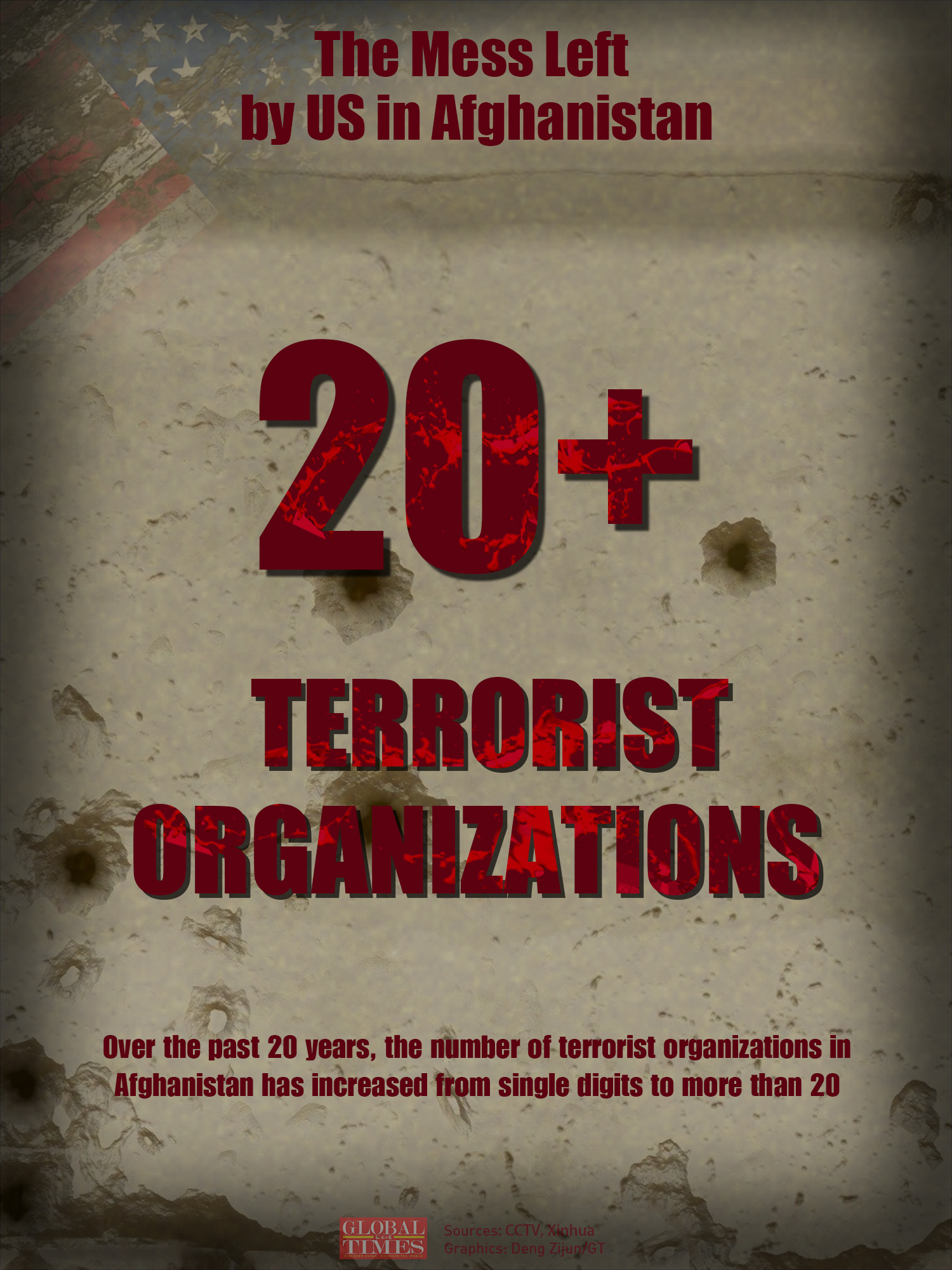
Graphic: Deng Zijun/GT


